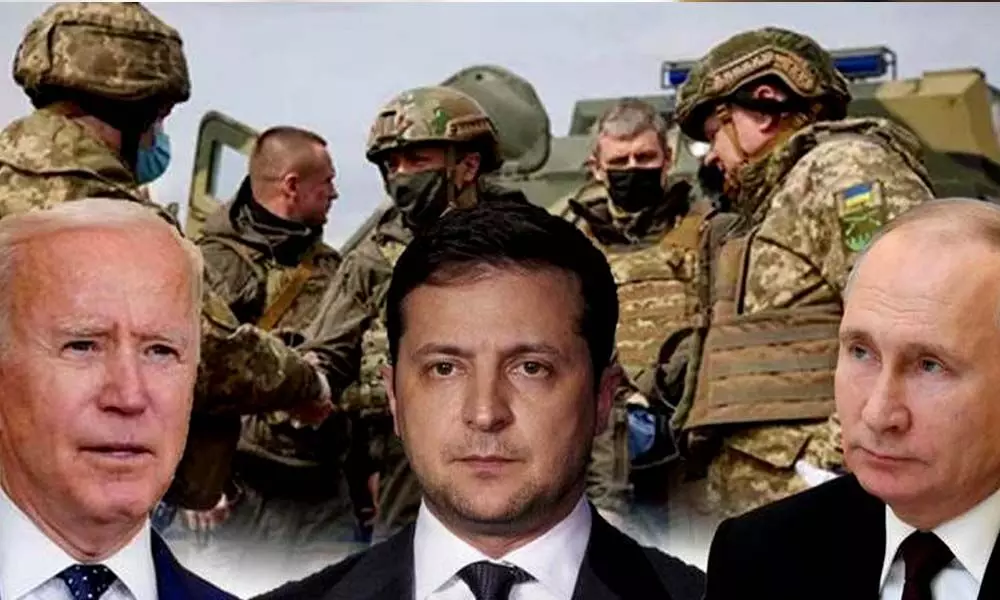How global military alliances could be biggest casualty of Russia-Ukraine stand-off?
NATO's failure to check Russia will embolden Beijing; it will become aggressive towards Taiwan in the coming years
image for illustrative purpose

This conflict might also force countries to allocate higher funds to modernize their armies, leading to the arms race. Surely it will benefit countries that are at the forefront of military production and prop up new ones like India. The biggest beneficiary of the Ukraine Russia stand-off has been China - as it is not in the spotlight post-Wuhan virus and military confrontation with India. China must be closely analyzing the western response to the Russian crisis and draw its strategy around Taiwan
President Putin is playing a game of Russian roulette on the Ukraine border by deploying thousands of troops. Yet, understandably, all NATO can do to counter Moscow's provocation is to engage in diplomacy, threaten with sanctions and send military hardware handouts to Kyiv; such a timid Western response will surely leave a deep and lasting impact across the globe.
The West-led resistance to President Putin has been on three front diplomatic; engagements with Russia, sending military hardware to Kyiv and threatening sanctions on key Russian companies engaged in energy, defence, and financial sectors. However, such Western tactics have not cut ice with Moscow; at best, it could achieve was "Russia's announcement to pull back some of the troops near the Ukrainian border to their bases after completing drills."
Western powers widely believe the Kremlin upped its aggressive posture by deploying over 1,00,000 Russian troops and sending forces to Belarus and other neighbouring countries to conduct military exercises to attack Ukraine for "showing overtures to join West-backed NATO."
The North Atlantic Treaty Organization(NATO), an international alliance that consists of 30 member states from North America and Europe, was "created to serve three purposes", and one of them being to deter "Soviet expansionism" (read Russia in today's context). And its "fundamental goal is to safeguard the Allies' freedom and security by political and military means."
However, when a 70 plus years old Western coalition fails to put up a credible military counter move to defend an independent country within its sphere of influence, it raises serious apprehensions and suspicions among nation-states that depend on Western powers for their security.
Through the Ukraine stand-off, Russia has challenged the unipolar statue of the world, where America was seen as the one great power. According to a geopolitical observer, who does not want to be named, Moscow will go all out to achieve "Putin's aspiration of reinstating former Soviet glory, especially in its geographical expanses. The timing of upping the ante on Ukraine can be seen as a direct fallout of the US handling of Afghanistan, where American leadership displayed a lack of appetite for confrontation. In a statement, Russian Foreign Ministry spokeswoman Maria Zakharova said the West has been "shamed and destroyed without firing a single shot" this explicitly depicts the mood in Putin's camp.
This crisis has also vindicated India's long-held stance that nations must be self-reliant to ensure national security. International respect is achieved by a combination of measures including but not limited to building credible military deterrence, presence in space, limited yet sufficient nuclear arsenal and every growing economic might.
The failure of NATO to present a substantial military response opens up another debate around the efficacy of international alliances. This millennium witnessed nations engaging in multiple economic, geopolitical, and military partnerships. Many of these groups also conducted round the year military exercises. However, all these mean nothing if - such alliances can not put up a definite military deterrence in times of crisis, as witnessed in the case of Ukraine.
Developed nations and democracies have avoided prolonged conventional war, and their leaders opted for diplomacy to military confrontation. This has encouraged countries like China and Russia to push their expansion agenda through military means. Another important question that comes to the fore is - what would have been Russia's response to a nuclear Ukraine. Would it have invaded Ukraine? In 1994 Ukraine "agreed to destroy the weapons and join the Treaty on the Non-Proliferation of Nuclear Weapons." The Russian aggression and NATO's response will force many nations who depend on Western protection to rethink their stand on ongoing nuclear. Furthermore, countries like Iran and North Korea will now seek nuclear arsenals with a sense of urgency.
This conflict might also force countries to allocate higher funds to modernize their armies, leading to the arms race. Surely it will benefit countries that are at the forefront of military production and prop up new ones like India.
The biggest beneficiary of the Ukraine Russia stand-off has been China - as it is not in the spotlight post-Wuhan virus and military confrontation with India. China must be closely analyzing the western response to the Russian crisis and draw its strategy around Taiwan.
NATO's failure to check Russia will embolden Beijing; it will become aggressive towards Taiwan in the coming years.
The biggest casualty of the Russia-Ukraine stand-off will be international military alliances. The crisis will establish that global partnerships and military drills are as good as the paper written on.
(The author is Founder, MyStartup TV)

